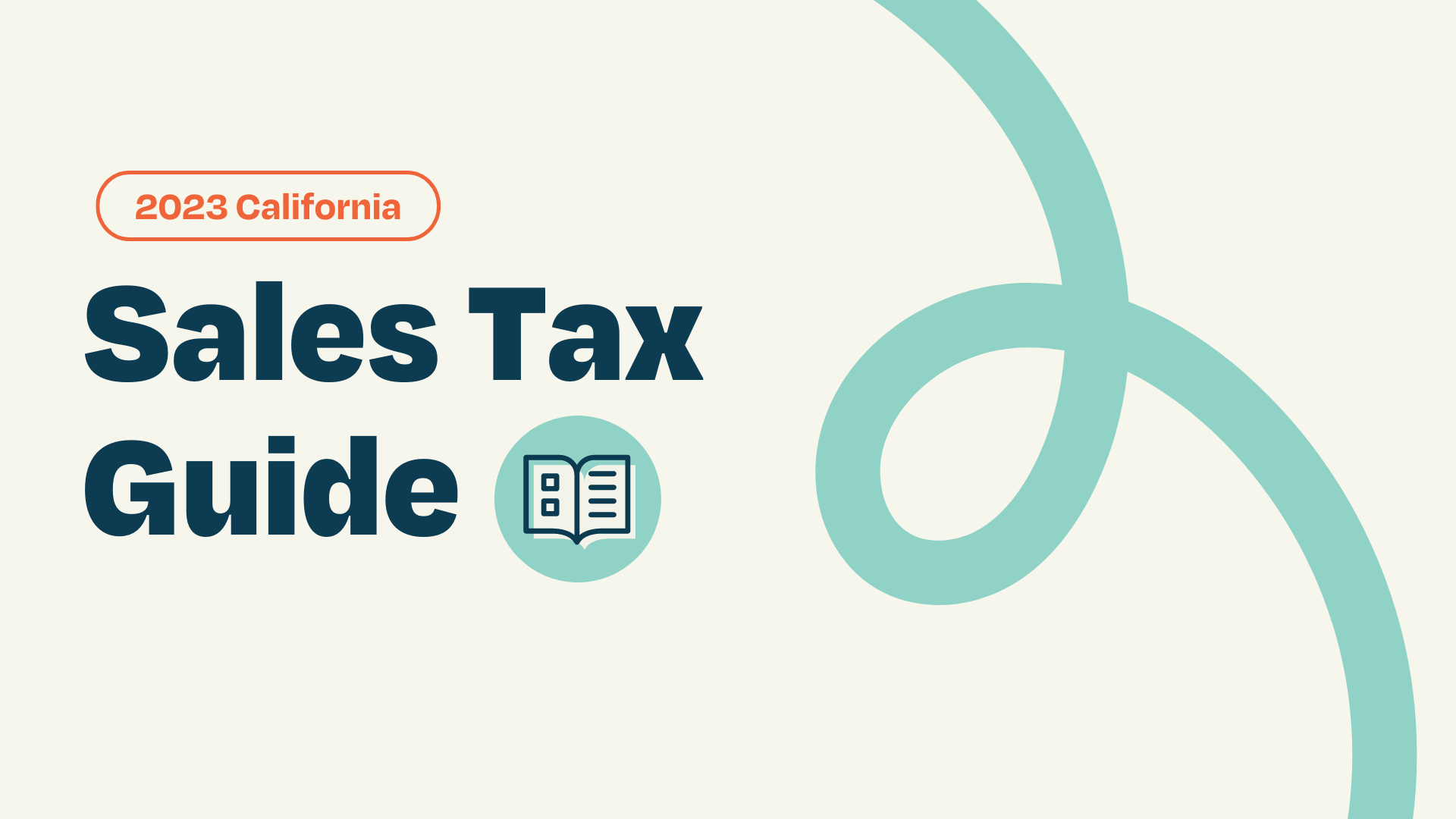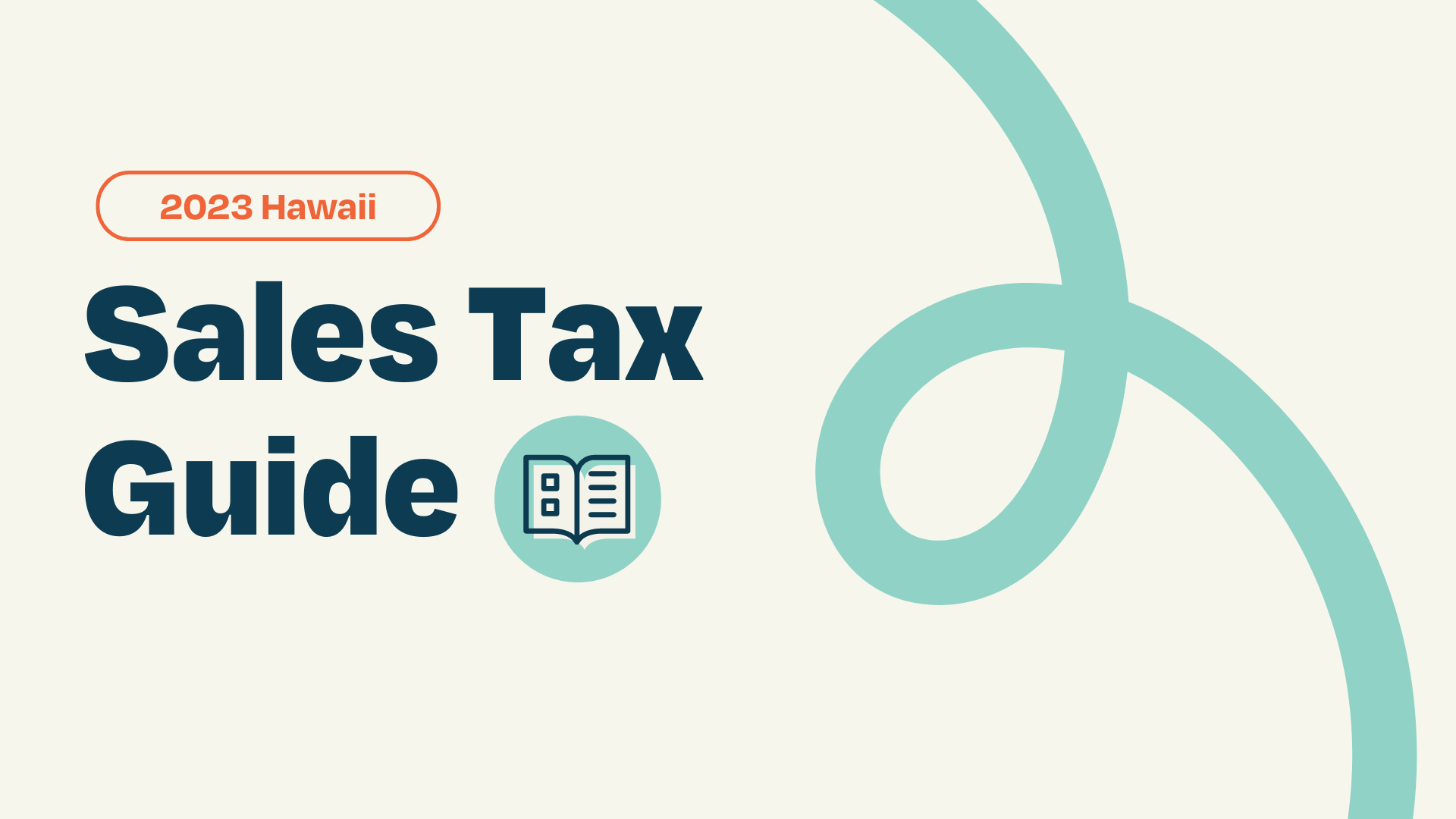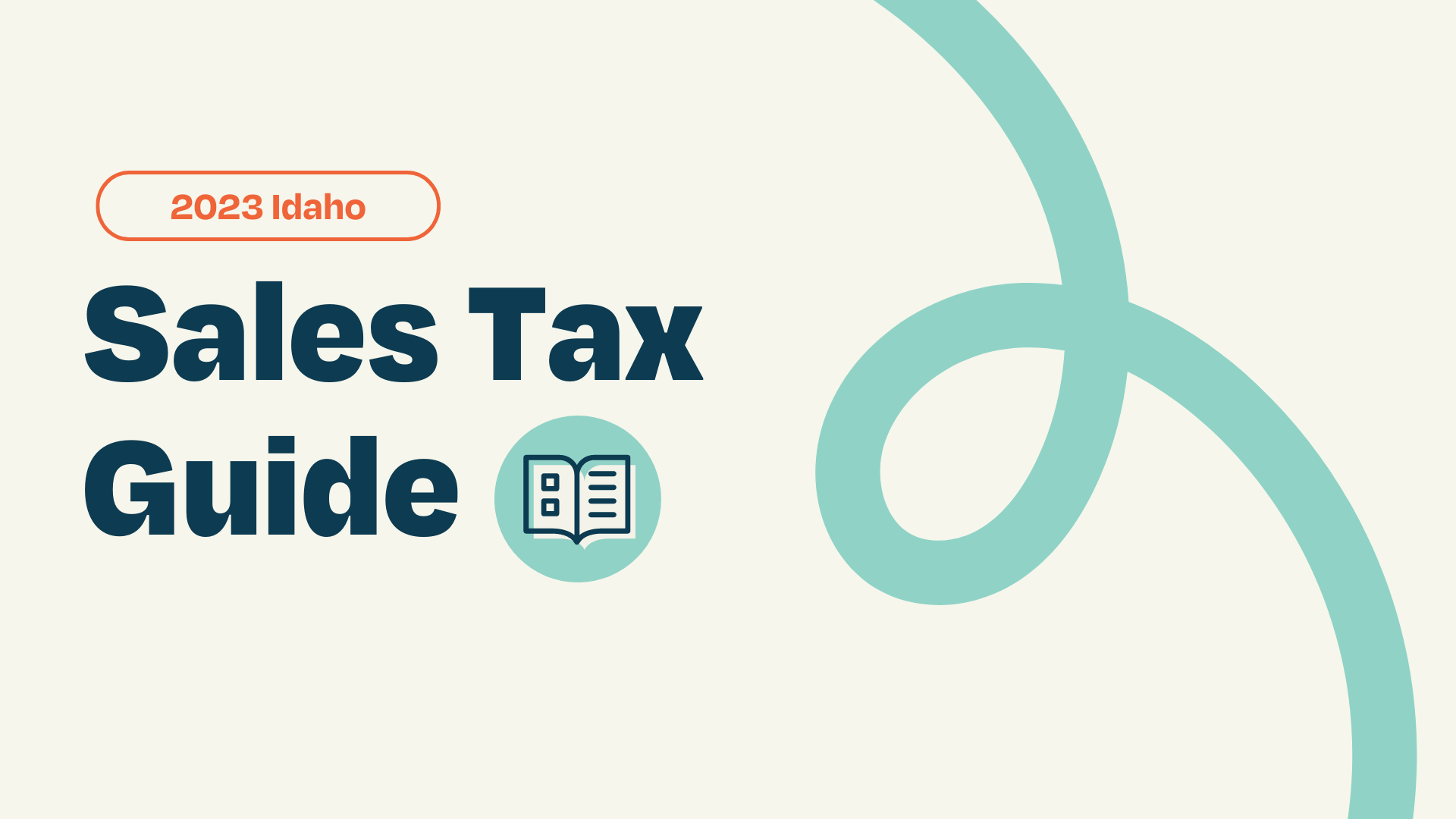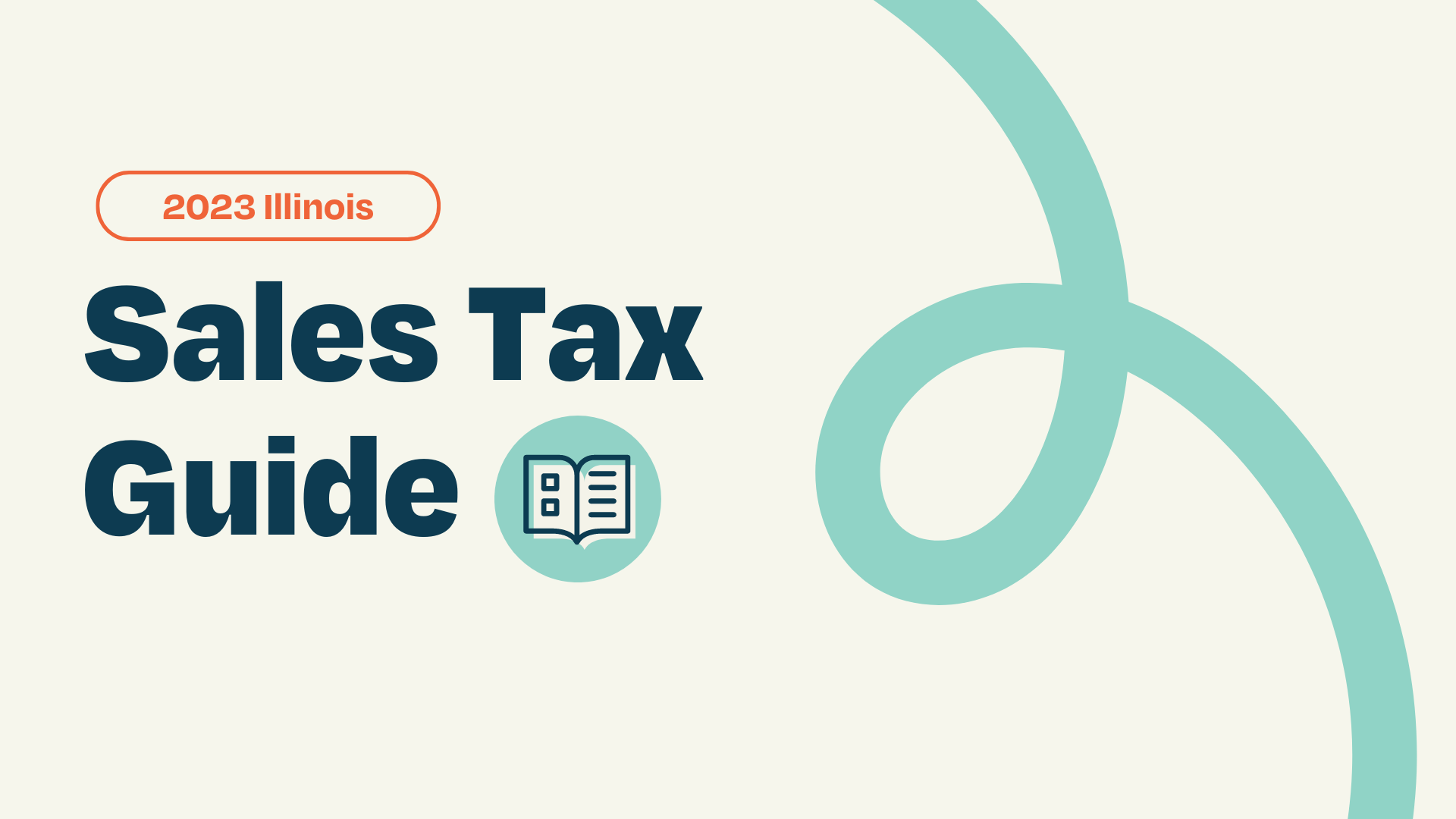1 min read
Hawaii 2023 Sales Tax Guide
Hawaii Sales Tax in a Word Aloha, dear reader! Imagine, if you will, you're on a dazzling beach in Hawaii, the golden sun on your face, the rhythmic...

As a small business owner, you have a lot on your plate. From managing employees to marketing your products or services, there are many competing tasks that require your attention each day. However, one area that should never be overlooked is proper accounting and sales tax management. Navigating the complexities of sales tax can be challenging, but this guide will help simplify the process and ensure compliance with California laws.
In this post, we'll discuss various aspects of California Sales Tax, including determining nexus within the state, registering your business for sales tax purposes, calculating rates based on applicable exemptions or taxable items, filing and paying taxes correctly to avoid common mistakes.
Additionally, we'll explore whether Software as a Service (SaaS) is taxed in California and how Accountingprose's services can assist you with managing your business's sales tax needs effectively. By following our California Sales Tax Guide closely, you'll gain valuable insights into navigating these complex regulations while minimizing potential issues that may arise from non-compliance.
|
Table of Contents |
✔️ Do you need to contact the California Department of Tax and Fee and Administration?
✔️ Unsure if you should call them or contact them through their website?
✔️ Do you wonder what information you need handy before you contact them?
If you answered “Yes” to any of these questions, you’re in exactly the right place!
You may contact the California Department of Tax and Fee and Administration by:
Calling 800-400-7115
Emailing them using this form
Visiting one of their office locations or
Chatting with the California Department of Tax and Fee and Administration online
There are three pieces of information that you should have on hand before you contact the California Department of Tax and Fee and Administration.
Be sure that you have the following handy:
Taxpayer Name
EIN
Sales & Use Tax ID Number (don’t worry, EIN will suffice if this number is misplaced)
If you are calling on behalf of someone else, or having someone else call on behalf of your business, you need to have one more piece of information: An active, signed California Power of Attorney (PDF).
Why?
If you do not have this, they will simply not be permitted to talk to you. This document authorizes the tax authorities in California to discuss a business’ taxes with someone other than the owner.
If you have any more questions, please feel free to contact us so we can assist you with your sales tax needs.
When considering your sales tax responsibilities as a business, one of the first and most important questions to answer is whether or not you have nexus in California. The concept of nexus refers to the sufficient connection between a business and a state which creates a tax obligation for that business. California, like many other states, has specific criteria for what constitutes a nexus, and it's crucial to understand these rules to maintain sales tax compliance and avoid potential penalties.
Navigating the complex world of sales tax can be a daunting task for any business owner. Among the most important concepts to understand is "nexus," the connection between a business and a state that creates a sales tax obligation. But what exactly creates a sales tax nexus, particularly in a state as large and economically diverse as California? The Golden State, home to a plethora of industries and one of the biggest economies in the world, has specific criteria for establishing both physical and economic nexus. From having a brick-and-mortar location to making a certain amount of sales, numerous factors can create a sales tax nexus in California.
Let's see what creates the different types of nexus in California...
In California, several conditions may establish a physical sales tax nexus, meaning a business has a sufficient physical presence in the state to be obligated to collect and remit sales tax on sales to customers in California. Here are some key factors:
Physical Location: If your business operates from a physical location in the state, such as a retail store, office, or warehouse, this constitutes a physical nexus.
Employees: If you have employees living and working in California, whether they are engaging in sales, providing services, or just performing administrative tasks, this can establish a physical nexus.
Inventory: Storing inventory for sale in a California warehouse, including those operated by third-party fulfillment services, creates a physical nexus. This includes inventory stored in California for sale through Amazon's FBA (Fulfillment By Amazon) program.
Sales Representatives: If you have sales representatives who visit California for the purpose of establishing and maintaining a market in the state, this can also create a physical nexus.
Delivery Vehicles: Regularly using your company's vehicles to deliver goods in California can lead to a physical nexus.
Temporary Physical Presence: Even temporary presence in the state, such as participating in trade shows or other business events, can create a physical nexus, though California does provide some exceptions for limited or occasional presence.
As of April 1, 2019, California has implemented an economic nexus law, which allows the state to require out-of-state sellers to collect and remit sales tax based on their economic activity in the state, rather than requiring a physical presence. This follows the landmark 2018 U.S. Supreme Court decision in South Dakota v. Wayfair, Inc., which allowed states to mandate that businesses with substantial economic presence in a state are responsible for collecting sales tax.
In California, you're considered to have an economic nexus if, in the current or preceding calendar year:
Sales Threshold: Your business's total combined sales of tangible personal property for delivery in California exceeds $500,000.
This threshold includes all sales of tangible personal property for delivery in California, even if the sales were exempt from sales or use tax. It's not just the taxable sales that are counted. Furthermore, this threshold applies to the total sales in the state, not per individual customer.
If your business exceeds this sales threshold, you're required to register with the California Department of Tax and Fee Administration (CDTFA), and you must collect and remit sales tax on all taxable sales that you make to customers in California.
California does not currently have affiliate nexus laws in effect.
California does not currently have click-through nexus laws in effect.
California implemented its marketplace facilitator law effective October 1, 2019. Under this law, marketplace facilitators, such as Amazon, eBay, or Walmart, are responsible for collecting and remitting sales tax on behalf of third-party sellers for sales made through their platforms.
Here's how it works:
Role of Marketplace Facilitators: If you're a seller who uses a marketplace facilitator to sell your products, and that facilitator is registered or required to register with the California Department of Tax and Fee Administration (CDTFA), the facilitator is considered the retailer for sales made through its marketplace. That means the facilitator is responsible for collecting and remitting sales tax on those sales, not the third-party seller.
Seller Obligations: Even though the marketplace facilitator is responsible for collecting and remitting the sales tax, as a third-party seller, you're still required to hold a seller's permit if you are engaged in business in California. However, you don't need to report or remit sales tax to the CDTFA for sales made through a marketplace that is registered or required to register in California.
It's important for third-party sellers to understand these rules and to track their sales separately — sales made on their own (direct to customer sales) versus sales made via a marketplace facilitator. This ensures accurate reporting and remittance of sales tax for those sales where they are the primary retailer.
As a business owner, one of the first steps in complying with California sales tax laws is to register your business. This involves applying for a California sales tax permit, also known as a seller's permit, with the California Department of Tax and Fee Administration (CDTFA). If you're engaged in business in California, whether through physical, economic, or marketplace nexus, you're generally required to register for a sales tax permit.
You can register for a California sales tax permit online through the CDTFA Online Services portal. The process is relatively straightforward. You'll need to provide details about your business, including business type, ownership details, business activities, business locations, and other relevant information. After submitting your application, it will be processed by the CDTFA, and you will receive your sales tax permit.
When registering for a California sales tax license, you'll need to have the following information at hand:
Your Social Security number, Individual Taxpayer Identification Number (ITIN), or Federal Employer Identification Number (EIN), if applicable
Your business's legal name and DBA (doing business as) name, if applicable
The business's start date in California
The North American Industry Classification System (NAICS) code that describes your business activity
Business structure (sole proprietorship, LLC, corporation, etc.)
Information about all owners, partners, or corporate officers
Business location address and mailing address
Information about your suppliers
Good news! Registering for a sales tax permit in California is free. However, depending on your type of business and the products or services you sell, you might need to post a security deposit. The CDTFA will inform you if a deposit is required after reviewing your application.
Yes, if your business is a partnership, corporation, or LLC, you'll need a Federal Employer Identification Number (EIN) from the IRS to register for a California sales tax permit. Sole proprietors can use their Social Security number or an EIN.
Besides the CDTFA, you might need to register with other agencies in California, depending on the nature of your business.
These can include:
California Secretary of State (for businesses structured as corporations, LLCs, or partnerships)
Employment Development Department (for employers),and
Local city or county agencies (for business licenses or permits).
Always check the requirements for your specific business type and location.
As a business with sales tax nexus in California, you are required to collect sales tax from your California customers and remit it to the state. The specific amount of tax collected depends on the location of the sale and the type of product or service being sold. This process may seem daunting at first, but with some basic understanding of the principles, you can ensure your business stays in compliance with California's tax laws.
California is what is known as a mixed sales tax state, but leans more towards being a destination-based sales tax state. This means that if you are selling a product to a customer within California, the sales tax rate of the buyer's location generally applies.
However, there's an added nuance. California also imposes district taxes, which can be origin-based. If a business has multiple locations in California, the district tax can depend on the originating location of the sale. But if the product is shipped, the district tax depends on the destination.
Therefore, if you're operating a business in California or selling to customers in the state, it's crucial to understand both the state and district tax rules. Given the complexity, businesses often leverage sales tax software or consult with a tax professional to ensure they're accurately calculating and collecting the right amount of sales tax.
If you sell your products from a physical store you own in California, you are required to collect sales tax at the point of sale. You should use the sales tax rate that corresponds to your store's location.
For online sales, you must collect sales tax based on the destination of the product – in other words, where your customer is located. This includes any local district taxes that apply.
The statewide sales tax rate in California is 7.25%. This includes a mandatory local rate of 1.25% and a state rate of 6.00%. However, local districts have the option to levy additional taxes, so the actual rate can be higher in some areas. Please verify the current rate, as it may have changed.
In general, the sale or lease of tangible personal property in California is subject to sales tax. This includes items like furniture, appliances, toys, artwork, and many others. Certain services that involve the creation or manufacturing of goods are also subject to sales tax.
California generally does not tax the sales of software as a service (SaaS). However, exceptions may apply, so it's important to review any recent legislative changes or seek expert advice.
Certain items are exempt from sales tax in California. These typically include groceries, prescription medicines, and certain medical devices. Also, sales made to non-profit organizations or resellers can be exempt if a valid resale certificate is provided.
Typically, the following entities may be eligible for sales tax exemptions in California: non-profit organizations, resellers who purchase goods for resale, and manufacturers who purchase raw materials.
If your customer provides you with a valid resale certificate or other proof of exemption, you should not charge sales tax on their purchase. Keep the certificate on file as proof of the exempt sale.
If you lose a California sales tax exemption certificate, it's crucial to get a replacement copy from your customer as soon as possible. Failure to keep a copy of the exemption certificate could make you liable for the sales tax if your records are audited. It's always a good idea to keep organized records of all your sales tax documentation.
Don't mess around with California sales tax returns - file them accurately and on time to avoid penalties and stay compliant with state regulations.
Determine your filing frequency: The California Department of Tax and Fee and Administration (DFA) will assign you a monthly, quarterly, or annual filing frequency based on your business's annual gross revenue.
Gather necessary information: Collect all relevant data, including total taxable sales, exempt sales, and the amount of sales tax collected during the reporting period.
Complete Form ET-1: Fill out the required fields in Form ET-1 - California Sales & Use Tax Return, which you can find on the DFA website.
Submit your return online or via mail: You can file electronically through the California Taxpayer Access Point (ATAP) or send a paper form to DFA by mail.
Pay any owed taxes: If you've collected more than $500 in taxes within a month or quarter, you must pay electronically using ATAP; otherwise, checks are accepted too.
Remember, late filings may result in penalties, so stay organized and adhere to deadlines.
Once you've successfully registered your business for a sales tax permit in California, started collecting sales tax, and understand which of your products are taxable, the next step is to file and remit the sales tax to the state. This process involves calculating the total sales tax collected and submitting a sales tax return along with the tax payment. Let's go over the specifics.
Businesses with a high volume of sales are typically required to file and pay their sales tax on a monthly basis. If you fall into this category, your sales tax return and payment are due on the last day of the month following each tax period. For example, your sales tax collected in January would be due by the end of February.
Businesses with a moderate volume of sales typically file and pay their sales tax on a quarterly basis. Quarterly due dates are April 30, July 31, October 31, and January 31.
Businesses with a low volume of sales often have an annual sales tax filing frequency. For annual filers, your sales tax return and payment are due by January 31 for sales made in the previous calendar year.
Keep in mind, these guidelines can vary, and the California Department of Tax and Fee Administration (CDTFA) will let you know your assigned filing frequency when you register for your sales tax permit.
In California, if a sales tax filing due date falls on a weekend or a holiday, the due date is automatically extended to the next business day. However, it's always a good practice to file and pay your sales tax a bit ahead of the deadline to avoid any potential issues or delays. Always consult the CDTFA's website for the most accurate and up-to-date information.
If you file your return or pay your sales tax late, the CDTFA may assess penalties and interest. The late filing penalty is 10% of the amount of tax owed, and the late payment penalty is 10% of the amount unpaid. Interest is also assessed on late payments and is calculated based on the statewide interest rate, which changes annually.
California is not a member of the Streamlined Sales Tax (SST) Agreement.
The SST is an initiative adopted by several U.S. states to simplify their sales tax laws and make it easier for businesses to manage sales tax compliance. It includes measures such as uniform definitions, simplified tax rates, and more efficient administrative procedures.
States voluntarily participate in the SST, and as of the last update, California has not chosen to participate. However, this could change, and it's always a good idea to check the latest information from official tax resources or consult with a tax professional.
If you file your return or pay your sales tax late, the CDTFA may assess penalties and interest. The late filing penalty is 10% of the amount of tax owed, and the late payment penalty is 10% of the amount unpaid. Interest is also assessed on late payments and is calculated based on the statewide interest rate, which changes annually.
In some states, businesses can benefit from a sales tax discount for timely filing and paying their sales tax. Unfortunately, California does not currently offer a sales tax discount.
Sales tax holidays are designated periods when specific items are exempted from sales tax. Sadly, California does not offer any sales tax holidays. However, the state may enact new legislation after this time. Always check the CDTFA's website or consult with a tax professional for the most current information.
Receiving a California Sales Tax Audit Notice can certainly be intimidating, but it's crucial to approach the situation calmly and take appropriate steps. Here's a suggested course of action:Review the Notice: Read the audit notice carefully to understand the specifics - what the state is requesting, why you're being audited, the years or periods involved, and the date by which they expect a response.
Gather Your Record: Start collecting the relevant documents. This generally includes sales invoices, exemption and resale certificates, purchase invoices, tax returns, and other business records that pertain to the period under review.
Contact a Tax Professional: It's highly recommended to seek professional advice at this stage. Engaging a tax consultant or a tax attorney who specializes in sales tax audits can provide invaluable guidance and representation. They can help understand the notice, prepare your documents, and even negotiate with the tax authorities on your behalf.
Respond in a Timely Manner: It's important to respond to the notice within the specified timeframe. If you need more time, your tax professional can usually request an extension.
Audit Process: The actual audit may involve an initial meeting with the auditor, a review of your documents, potentially further questions, and then a final meeting to discuss the results.
Review Audit Results: If you agree with the results, you'll need to arrange payment for any tax due. If you disagree, you have rights to appeal, often within a specific timeframe.
Remember, an audit notice does not necessarily mean you have done something wrong. It's a part of the state's process to ensure tax compliance. Your cooperation and organization can greatly contribute to a smoother audit process.
Navigating the intricacies of California's sales tax system can be a challenging task for any business owner. Errors can be time-consuming, costly, and could potentially lead to penalties or audits. Fortunately, by being aware and proactive, you can sidestep some common pitfalls. Here are five tips to help you avoid mistakes when filing your California sales tax returns:
Understand Your Nexus: Knowing where you have sales tax nexus is the foundation of sales tax compliance. If your business has a presence in California through a physical location, inventory, employees, or certain economic and affiliate connections, you're likely required to comply with California's sales tax laws.
Apply for a Permit: You must register for a California sales tax permit before you start collecting sales tax. It's unlawful to collect sales tax without a valid permit. Also, ensure to renew your permit as needed and keep your business information updated with the CDTFA.
Collect the Right Amount: Be aware of the state, county, city, and district tax rates where your customers are located. The total sales tax rate in California can vary widely depending on the jurisdiction.
Keep Accurate Records: Maintain detailed records of every taxable sale, amount of tax collected, and any exempt sales. These records are essential if your business ever gets audited. Plus, they make filing your return much easier.
File and Pay on Time: Late filings and payments can result in penalties and interest. Be aware of your filing frequency (monthly, quarterly, or annually) and mark your calendar with your due dates. If a due date falls on a weekend or holiday, your return and payment are due the next business day.
Remember, when it comes to sales tax, proactive compliance is key. Understanding your obligations, collecting the right amount, maintaining thorough records, and meeting your deadlines can help you avoid costly mistakes and keep your business in good standing with the CDTFA.
|
Alaska Sales Tax Guide (N/A) |
||||
|
Montana Sales Tax Guide (NA) |
||||
|
Oregon Sales Tax Guide (N/A) |
||||
|
Delaware Sales Tax Guide (N/A) |
||||
|
New Hampshire Sales Tax Guide (NA) |
||||
This blog is for informational purposes only and the information is accurate as of 2023-06-03. If you want legal advice on sales tax law for your business, please contact a State and Local Tax (SALT) professional. Keep in mind that sales tax regulations and laws are subject to change at any time. While we strive to keep our blog current, this blog possibly may be out of date by the time you review it.

1 min read
Hawaii Sales Tax in a Word Aloha, dear reader! Imagine, if you will, you're on a dazzling beach in Hawaii, the golden sun on your face, the rhythmic...

Idaho Sales Tax in a Word Hey there, fellow business owners! Are you ready to tackle the world of sales tax in Idaho? We know it can be a daunting...

Illinois Sales Tax in a Word Hey there, fellow Illinoisans! Welcome to our blog, where we're diving deep into the exciting world of sales tax...